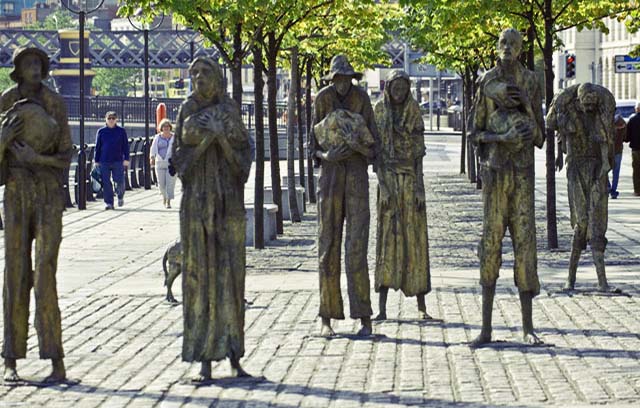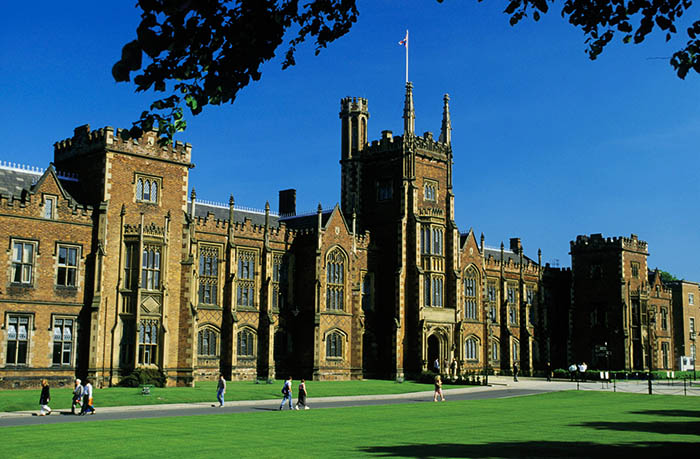
As a result of Great Potato hunger of 1845-1850 a quarter of the population of Ireland (2 209 961 persons) or died of hunger, or emigrated to neighboring countries. If as the reason of international disagreements it is possible to consider one event, then the source of hatred of Irish to all British is behind the event called by the Great Potato hunger which struck this small emerald country in 1845 and continuing five years — till 1850. During this time the population of the country decreased by a quarter: 1 029 552 persons died of hunger, a scurvy, sypny and a typhoid and 1 180 409 people emigrated, mostly to America. Seeds of the deepest hatred which developed then into bloody revolts were so seeded. They will respond in the present and the future still more than once. For 45 years before this hunger Ireland if did not live in clover that, in any case, prospered. But with leaving of army of Wellington in 1815 there was a surplus of a manpower. Surplus of working hands could be useful as in Ireland abundance of fertile soils and rich fields. But British removed not only forces of Wellington. They as it was found out later by Irish, were specialists in part of taxation by taxes and their collection. Grain laws imposed to small land owners inconceivable tariffs. The whole herds of a livestock, the barque of oats, wheat and rye went from increasing population of Ireland to England now.
“Infinite herds of cows, sheep and pigs — the Irish writer John Mitchell reported — with a frequency of inflow and otliv left all 13 seaports of Ireland …”
And as the population of Ireland continued to grow (by 1800 reached 5 million people that there is more population of America of that time), its consumer basket became more and more poor. At last, Irish, along with Belgians, got a nickname of “kartofeleed” as potato became a main course in their menu.
So, by the beginning of the XIX century Ireland was not the rich country any more, poverty was felt everywhere. And as the most part of its agricultural products was transported to England, hunger began here soon.
Thomas Carlisle traveling around the country wrote: “Never saw in the world of similar poverty … Often infuriated me as beggars besieged us as if the stray dogs snatching on drop … At the sight of such scenes human pity leaves, leaving instead of itself stone estrangement and disgust”.
But the worst waited ahead when the British land owners for failure to pay a rent began to move tens of thousands of starving peasants from lands. The count Lyyukan in the County of Mayo extolled by Alfred, lord Tennyson in his “Charge of the Light Brigade” moved from hovels of 40 000 peasants when they could not pay it a rent.
And when potato fields were affected by an illness, for British it was the chance to rescue the honor and millions of lives. But instead the count Lyyukan even more toughened living conditions of peasants. The Irish correspondent “London tayms” Sydney Godolfin Osborn called his actions “philanthropic”, considering that they helped to stabilize the population. And the good-natured person Tennyson did not fail to tell the word, having noticed: “Celts are all finished blockheads. They live on the awful island, and they have no history, worthy even a mention. Why nobody can blow up this nasty island dynamite and sweep its pieces in different directions?”
The first prerequisites of accident of the 19th century were that.
Meanwhile in Ireland poverty and poverty extended with a plague speed. The most part of the population which grew up by 1845 to 8,2 million people existed on water and lamper, the gray tubers used around the world as a forage for pigs.
When because of an illness harvests and this culture decreased, hunger began to amplify. Tens of thousands of people quietly died houses, tens of thousands perished along roads. People died not only of cholera, a scurvy and typhus, but also of overcooling. The huge mass of peasants were thrown out from houses when any more wheat could not reap crops to pay a rent. Also cannibalism cases met. Small graves dug directly near the road. They were often profaned by stray dogs who broke off corpses on part and took away on all the district.
In “A black prediction” William Carlton wrote: “Roads from funeral processions became literally black. And on the road from one church parish to another you were accompanied by death bells which sound was measured and sad. Triumph which was gained by bubonic plague over our ruined country, the country, every day becoming more and more unfortunate and more and more mournful”.
Meanwhile from 13 ports of Ireland the ships, loaded grain and other agricultural production continued to leave. The ships took away emigrants whose ranks grew almost to 2 million people. Strong young hands became the main export of Ireland. But in the forties the 19th century emigrants understood that life in other countries is better for the little, than in Ireland. England treated them as to pariahs, and forced to huddle in hovels and cellars. In America they faced the similar relation which graphic evidence were the plates which are hung out everywhere with inscriptions: “To Irish not to disturb”. These circumstances forced them to gather in the Irish ghettoes in New York, Baltimore and Boston where half a million Irish died.
England tried to create new workplaces for Irish in the homeland. It was the hardest work for a beggarly payment. Constructed the roads leading nowhere. Grandiose public projects which had to reduce mortality because of skirmish in parliament just got lost.
Benjamin Disraeli noticed: “One day — the priest, other day — potato”. The prime minister lord of Salisbury compared Irish to the Huguenots not capable neither to self-government, nor to a self-survival.
Only lord John Russell, acting in chamber of lords on March 23, 1846, showed concern and brought up questions of responsibility: “We turned Ireland, and I tell it intentionally, we turned it into the most backward and most unfortunate country in the world … The whole world holds us up to shame, but we are equally indifferent also to our dishonor, and to results of our inept management”.
But his speech rolled in indifference and mass of another matters, such as the beginning Anglo-sikhskoy wars in India. Only time will relieve Ireland of hunger, but will not exempt it from anger.






Leave a Reply